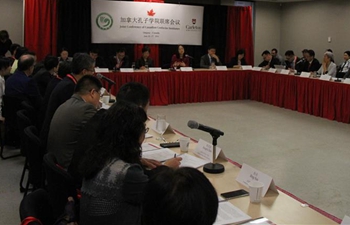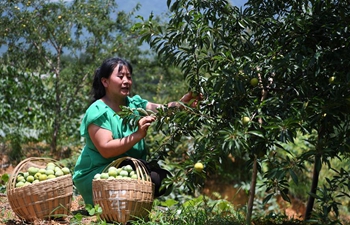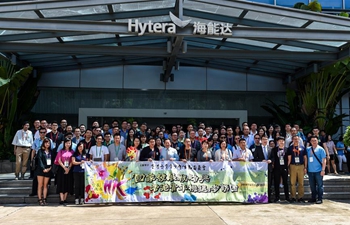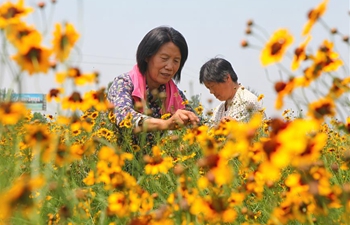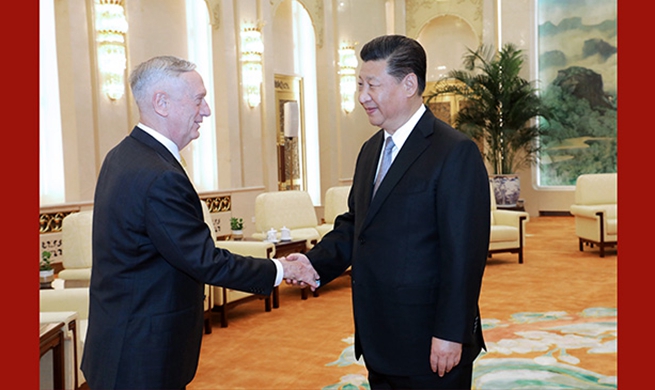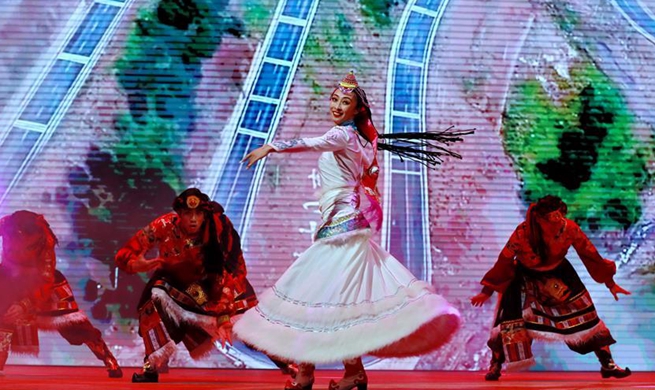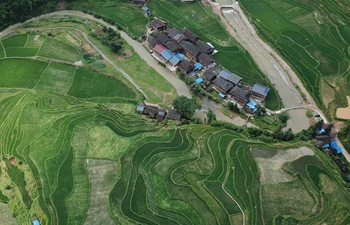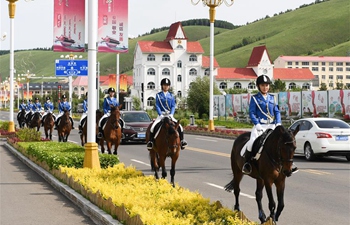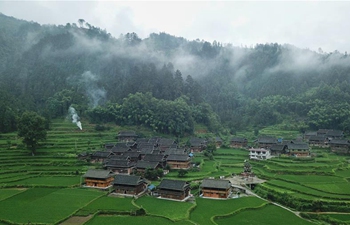by Han Liang
BEIJING, June 27 (Xinhua) -- Only a few years ago, when people talked about the TV industry, China was seen as a key buyer and a gigantic export market.
In the past, if you flipped through TV programs in China, you would see formats from The Netherlands, Britain and South Korea and other countries around the world. Now, the trend is reversing as ambitious Chinese producers and TV channels are seeking to develop original formats and export their own productions.
FROM "MADE IN CHINA" TO "CREATED IN CHINA"
In April, Chinese producers showcased original Chinese TV show formats at the annual MIPFormats event in Cannes, France.
"National Treasure," a weekly program featuring the history of 27 Chinese cultural relics, garnered huge interest from abroad after it became a hit in China.
In historical reenactments, celebrities and ordinary people acted as emperors and artists to show the story behind each artifact. The program kindled the Chinese people's national cultural pride.
Experts said the program offers a complete format to overseas buyers and it is not difficult for people from different cultures to enjoy it.
China is on its way to become a global provider of original TV formats, said Laurine Garaude, director of the television division of Reed MIDEM, the host company of MIPFormats.
It was not the first time that Chinese TV productions had impressed overseas buyers. "Ancient Games," an epic sport reality show, was presented at the Cannes TV event in 2017.
The gladiatorial show was a hybrid "baby" of Chinese company 3C Media and British Indie producer ZigZag. The idea was first proposed by ZigZag, and co-developed by the pair.
Matt Graff, managing director of ZigZag, recalled the cooperation with the Chinese team as fascinating, as he was touched by the pioneering spirit of the Chinese colleagues in localizing and polishing the structure.
Both sides agreed that the show should blend local and global elements to reach a larger market.
Cuju, an ancient Chinese football game, also widely seen as the earliest form of football, was highlighted in the show.
Graff said it is a perfect example of how cooperation between Chinese and British TV production could yield fruits and how a little idea turned into a huge success.
Dawn McCarthy-Simpson, director of International Strategy with the Producers Alliance for Cinema and Television (PACT) in Britain, saw things similarly.
She said China's ambition has moved from "Made in China" to "Created in China." With over 3,000 TV channels, the industry is full of opportunities.
Besides entertainment, on the documentary front, China is also gradually becoming a key player in the global market.
Recently, Chinese Internet giant Tencent and BBC signed an agreement on producing high-quality documentaries together.
BBC has seen the huge potential and advantages of online platforms in China, with the co-produced "Blue Planet" reaching 220 million viewers globally.
Jason Emerton, funding and commercial manager for co-productions with BBC, said co-production will help both sides share their resources, complement each other and expand the common market.
STUDENT MUST SURPASS MASTER
As increased government financial support and heavy investment from the private sector have invigorated China's TV sector, creative collaboration with overseas productions offers valuable knowledge, experience and expertise for a more mature industry, some front-line practitioners have said.
Yao Xiaoying, a veteran Chinese TV producer and director, believed that adapting overseas formats into Chinese versions was more a matter of re-creation rather than merely copying. To make something phenomenal, learning-by-doing is not enough; one could say that the student has to surpass the master.
A few years ago, she and her team worked on adapting the British reality show "The Cube" into a Chinese version. From brainstorming to idea-pitching, from casting to shooting, all procedures were highly standardized, which streamlined the whole process, Yao recalled.
As a quick learner, Yao caught the essence and adapted it into a domestic version with a new feel.
Yao believed that while industrialization is the guarantee of quality, innovation provides a real competitive edge for success.
Still, she admitted that Chinese TV production lags behind its Western counterparts on the industrial level and has a long way to go.
Wang Xinyi, a director and producer with SMG Dragon TV based in Shanghai, holds a similar view.
During an exchange program organized by PACT, he visited a post-production company in London, where he could hardly find a piece of paper since everything was digitalized, he said.
"That's still hard to reach in China and indicated China still has a lot to learn from the West," he said.
Meanwhile, China has its own advantages. Wang said innovation and originality are not only about making something from scratch, but also about telling an old story with a new perspective, sometimes via a fixed camera.
His work, "The Story in an Emergency Room," was inspired by a British reality medical show "Jeremy Kyle's Emergency Room." Yet the Chinese version adopted a different narrative.
Using fixed cameras, the show demonstrated the sometimes tense relationship and trust crises between doctors and patients in China, the humanitarian spirit behind doctors' daily work, and the dignity, strength and resilience of life.
"That's the most touching point of this program, and what differs from the original show," Wang said.
Besides non-scripted reality shows, Wang has also created cultural shows, which are becoming more popular in China. He said the essence is combining taste, culture and visual art and making them appealing to young viewers.
It is not only about chanting ancient poems and presenting traditional operas, but also about refreshing the cultural memory and making tradition more fashionable, he said.
CHANGING LANDSCAPE
Over the past decade, huge changes have taken place in the Chinese media landscape which has brought more opportunities to international producers. The Western desire to get money out of China rather than see the country as a creative hub "has been a big mistake," McCarthy-Simpson said.
In a newly released British TV Export Report by PACT, a recently-signed Britain-China TV co-production treaty between the two countries offers the opportunity for them to further build great content together. Both factual and entertainment were the two genres in which the highest growth was expected, according to the report.
Apparently, a shift occurred when foreign TV studios saw that most of their revenue originated from overseas markets, predominantly from China. The market is just too big to ignore. Yet licensing programs and formats will become more difficult with the introduction of stiffer quotas, as well as a higher standard -- it is difficult to excite Chinese producers since they've seen almost all formats.
She suggested that Britain treat China differently and think of more creative ways to work with Chinese counterparts, look more at co-production and co-creation deals, and create a cultural blend of East and West.
Previously, ITV and Chinese media company Huace co-developed a celebrity sports reality show, "Stars on Ice," showcasing the charm of figure skating for Chinese audiences as part of the early lead-up to the 2022 Beijing Winter Olympics. The localized version was broadcast on Chinese screens since 2016 and well received by Chinese audiences.
Wilson WorldWide Productions, an Indie production company in London, has been producing a thriller TV series based on a bestseller.
Joshua Wilson, CEO of the company, told Xinhua that the story is full of Chinese elements. The heroine is a Chinese lady and the story will be filmed in Shanghai, Hong Kong and other Chinese cities.
October Films Executive Chairman Denman Rooke put his Chinese name and Wechat ID on his business card. The renowned director and producer has been in the TV industry for decades and decided to make China his priority in the future.
He showed a detailed documentary pitch named "Chinese Cuisine Goes Global" in Chinese, and said everything was ready except partners from China to make it come true.
A theme that resonates with global viewers, along with top co-producing personnel from China and Britain, would make a really good story, he said.
For producers like Yao and Wang, the roadmap of China's TV industry over the past decade has changed dramatically.
Actually, the secret behind this innovation wave appears to be aspiration -- China strives to be a new creative hub in TV production, to create shows that both educate and entertain, to tell a China story that is both fascinating and enlightening to the world.




